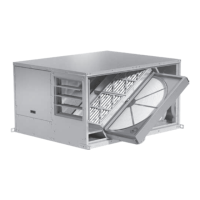Start-Up Components
Fans
All ERV models except ERV-
10 contain two forward curved
(supply and exhaust) fans.
These forward curved fans
should be checked for free
rotation. If any binding occurs,
check for concealed damage
and foreign objects in the fan
housing. Be sure to check
the belt drives per the start-
up recommendations in the
following section.
CAUTION
When operating conditions of the fan are to be
changed (speed, pressure, temperature, etc.), consult
Greenheck to determine if the unit can operate safely
at the new conditions.
4. Align fan and motor sheaves with a straight-edge or
string and tighten.
5. Place belts over sheaves. Do not pry or force belts,
as this could result in damage to the cords in
thebelts.
6. With the fan off, adjust the belt tension by
moving the motor base. (See Fan Belts for more
information). When in operation, the tight side of
the belts should be in a straight line from sheave to
sheave with a slight bow on the slack side.
Fan Performance Modifications
Due to job specification revisions, it may be necessary
to adjust or change the sheave or pulley to obtain
the desired airflow at the time of installation. Start-up
technician must check blower amperage to ensure that
the amperage listed on the motor nameplate is not
exceeded. Amperage to be tested with access doors
closed and ductwork installed.
Fan Belt Drives
The fan belt drive components, when supplied by
Greenheck, have been carefully selected for the
unit’s specific operating condition. Utilizing different
components than those supplied could result in unsafe
operating conditions which may cause personal injury
or failure of the following components:
• Fan Shaft • Bearings • Motor
• Fan Wheel • Belt
Tighten all fasteners, set screws securely, and realign
drive pulleys after adjustment. Check pulleys and belts
for proper alignment to avoid unnecessary belt wear,
noise, vibration, and power loss. Motor and drive shafts
must be parallel and pulleys in line (see diagrams in this
section).
Fan Belt Installation
1. Remove the protective coating from the end of the
fan shaft and assure that it is free of
nicks andburrs.
2. Check fan and motor shafts
for parallel and angular
alignment.
3. Slide sheaves on shafts.
Do not drive sheaves
on as this may result in
bearingdamage.
Belt Span
Deflection =
Belt Span
64
WRONGWRONG
WRONG CORRECT
WRONGWRONG
WRONG CORRECT
Forward Curved
Exhaust Fan
Direction of Fan Wheel Rotation
Blower access is labeled on unit. Check for proper
wheel rotation by momentarily energizing the fan.
Rotation is determined by viewing the wheel from the
drive side and should match the rotation decal affixed
to the fan housing (see Rotation Direction figures
below). If the wheel is rotating the wrong way, direction
can be reversed by interchanging any two of the three
electrical leads. Check for unusual noise, vibration, or
overheating of bearings. Refer to the Troubleshooting
section of this manual if a problem develops.
Fan RPM
Supply fan and exhaust fan will have an adjustable
motor pulley (on 15 HP and below) preset at the factory
to the customer specified RPM. Fan speed can be
increased or decreased by adjusting the pitch diameter
of the motor pulley. Multi-groove variable pitch pulleys
must be adjusted an equal number of turns open
or closed. Any increase in fan speed represents a
substantial increase in load on the motor. Always check
the motor amperage reading and compare it to the
amperage rating shown on the motor nameplate when
changing fan RPM. All access doors must be installed
except the control center door. Do not operate units
with access doors open or without proper ductwork
in place as the fan motors will overload.
R
o
t
a
t
i
o
n
R
o
t
a
t
i
o
n
R
o
t
a
t
i
o
n
Backward Inclined
Forward Curved
Airflow
R
o
t
a
t
i
o
n
R
o
t
a
t
i
o
n
Backward Inclined
Forward Curved
Energy Recovery Ventilator 19

